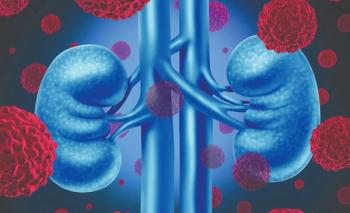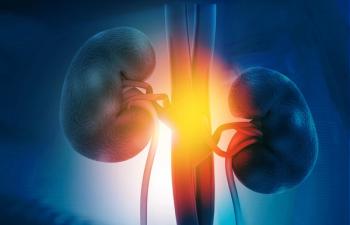
Nephrectomy for RCC May Result in Significant Declines in Renal Function
Patients with RCC had greater postsurgical decreases in kidney function compared with patients with upper tract urothelial carcinoma.
Despite having better baseline kidney function and overall health status, patients with renal cell carcinoma (RCC) had greater postsurgical decreases in kidney function after undergoing a radical nephrectomy compared with patients undergoing a radical nephroureterectomy (RNU) for upper tract urothelial carcinoma (UTUC).
These results were
According to the study, surgical management of both RCC and UTUC involves radical removal of a renal unit, with the additional removal of the ureter in patients with UTUC. With this study, the researchers hoped to identify risk factors that predict a decline in renal function after radical nephrectomy for RCC or RNU for UTUC.
Margulis and colleagues looked at clinicopathologic data from 435 patients; 317 underwent radical nephrectomy and 118 had an RNU. Patients’ estimated glomerular filtration rate (eGFR) was calculated preoperatively, 3 months postoperatively, and at last follow-up. An event was defined as a decrease in eGFR of 25% or greater from baseline.
Baseline characteristics showed that patients with UTUC were significantly more likely to be older, have a worse Charlson comorbidity score, and to use tobacco. In addition, patients with UTUC had a lower median baseline eGFR (58.4 vs 74.9; P < .001).
However, after surgery, patients with RCC had a larger event rate at both the first follow-up point (56.8% vs 31.4%; P < .001), and at the last follow-up (51.7% vs 35.6%; P = .003) compared with patients with UTUC. They had greater decreases in median eGFR from baseline after their surgical procedures compared with UTUC patients at both first (−28.3% vs −10.6%; P < .001) and last follow-up visit (−26.1% vs −15.8%; P = .002).
This decline in renal function predicted non–cancer-specific mortality (CSM) in RCC patients at first (hazard ratio [HR], 4.71; P = .041) and last follow-up (HR, 4.56; P = .018). Although patients with UTUC did have worse non-CSM (P < .001), a decline in renal function at follow-up did not predict non-CSM.
“These results may facilitate preoperative counseling for patients harboring these malignancies by guiding expectations for postoperative renal function, and further shed light on differences in global renal function dynamics between these two forms of kidney cancer,” the researchers wrote.
Newsletter
Stay up to date on recent advances in the multidisciplinary approach to cancer.




















































